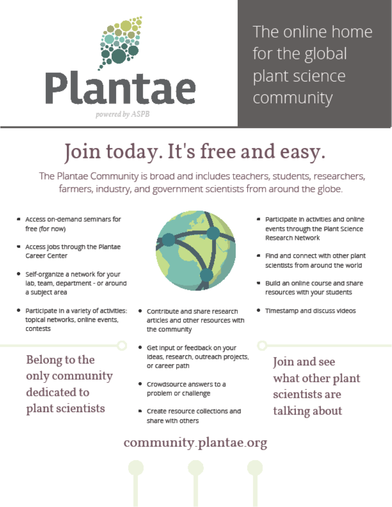|
Hi Everyone! It's been a while since I posted...been busy...you know the drill (and all the excuses!). Part of the being busy this time is that one of my new procrastination activities is being involved in the Plantae network/platform. This is a platform for anyone interested in plants to post advice, ask questions, read articles - basically interact on a global scale. It's like facebook for planty people. This includes career advice and job adverts. It's free to sign up (and you can be as anonymous as you like if you choose to use a different user name). Details in the flyer below. I want to emphasise that ANYONE can sign up - there are networks for teaching, for different plant societies and articles and advice on all types of plant science. It's getting momentum with some great interactions and resources available which is great - so come and join us if you haven't already! Personally I'd also love to see more schools/school teachers sign up and to help this become a bridge between school and university plant science teaching (and if you are a teacher and have questions, feel free to email me - we are still exploring what this platform can do and your advice and questions are very welcome). As an example I just posted a comment on mentoring in response to a fabulous article written by Mary Williams on getting the mentoring you need. You can read Mary's article here but to comment you will need to sign up. I've posted my comment below the advert. "I always find this [mentoring] an interesting topic. The advice above [in Mary's article] is really good. Although I didn’t have it put so plainly, this is similar to advice I collated over my early years at Uni. The most important message in all of this is that it’s up to you to find mentoring that works for you – academia is incredibly diverse with different people having different requirements and ultimately it’s your life so make the most of it!
I think a key thing to remember is that there are different types of mentor. There are the official ones allocated to you by the institution, there are unofficial mentors you create (in my experience a lot of this is dependent on personality types) and there are your friends. I’m going to just briefly comment on each type and my experiences. The official mentors: these are people allocated to you by your institution and different institutions have different allocation strategies with one common theme – none of them automatically work for everyone. At Nottingham when I first arrived I was given a questionnaire with a range of questions, most of which I’ve forgotten – the most important one was “do you want someone in your division?”. My answer was an emphatic NO! For me I needed someone who I could ask advice outside the divisional structure and outside my own line management structure (at least a little bit). And that was probably the first really good strategic decision I made here. That person is still a mentor (probably still officially) and will remain a mentor for life. A lot of people at Nottingham think the official mentoring scheme doesn’t work but I think it’s up to us to make it work for us. To mentors – I think it’s particularly important to take new staff under our wings – they are the ones who don’t know who to approach at the beginning, and the beginning is the steepest learning curve (BELIEVE ME!). Unofficial mentors: I have a lot of these and they fall within the different categories in Mary’s article above. Some are likely to be on my promotions panel one day, some are colleagues who are a few years ahead of me and have been through the early career academic years recently enough to provide helpful advice on things from university structures to coping with the onslaught of email requests. Some are people who I’ve met along the way. I have several mentors in Australia where I studied and where I worked in industry and I regularly call on them for advice (always when I’m back in Aus but also from time to time from the UK). I recently reconnected with two different mentors who I haven’t been in touch with since before I left Australia almost 6 years ago. One of them I haven’t seen since my honours year finished back in 2005. I’ve always found people like to find out where I’ve ended up (and I think that’s regardless of where I could have ended up). So the advice about staying in touch with mentors is really important! Friends: This group is perhaps the most important group of mentors and probably the least talked about. This doesn’t mean every friend is a mentor – this is the group of people that you go to in times of difficulty. Your friends are the people you can talk to about any problem including those linked to work. They should be able to give you comfort for difficult situations and an airing board for possible solutions before you go and talk to your unofficial or official mentors. If you’re like me and get really frustrated with certain situations, the friend-mentors are the people I rant to (usually with a heated voice, often with tears) until I calm down and can approach a problem more strategically (those of you who know about myers-briggs – I’m an E(I)NFJ –I sit on the E-I divider and F(feeling) and J(lists-about-lists) are my stronger traits). The friends-mentors group is the group I missed a lot when I first moved here – I still had my friends elsewhere but they weren’t here and crying at a computer screen over skype doesn’t have the same effect as someone sitting in the same room (those of you going through that – I get it totally). It takes time to build that group of friend-mentors and I have learnt to be persistent with skype because it does take the edge off even when I’m in my introvert mode. I have found that being on a Nottingham Research Fellowship has helped this because some of the other fellows have become strong friends and we take time for coffees now and then when I’m at our University Park campus. This is what my experiences have been but I really think mentoring is up to YOU to find what YOU need. Be persistent in asking for what you need and be pro-active within your institution (or wider community) – the best mentors are the ones you choose through interaction, whether that’s through going to seminars, or professional development courses or on the university tennis team. I’m going to end there and just remind everyone to not only look up for mentors but to pay it forward – I had people help me, so I feel it's my duty to mentor others."
1 Comment
|
AuthorAmanda Rasmussen Archives
May 2023
Categories |

 RSS Feed
RSS Feed
